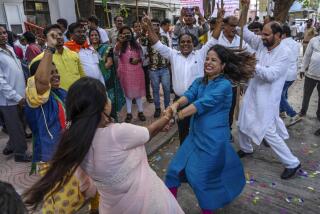Sikh Party Wins Punjab Election : Will Rule Troubled State; Gandhi Slate Defeated
- Share via
NEW DELHI — The Sikh party Akali Dal scored a dramatic victory over the Congress-I of Prime Minister Rajiv Gandhi in Wednesday’s election in Punjab, winning the right to form a government in the state, official returns showed early today.
It was the first outright victory ever for the Akali Dal, which represents moderate Sikh forces in troubled Punjab, the scene of more than four years of bloody conflict sparked by Sikh extremists who want an independent homeland for India’s 15 million Sikhs.
Returns Incomplete
Still-incomplete returns indicate that the Akali Dal won at least 70 of the 117 seats in Punjab’s assembly and a majority of the state’s 13 contested seats in Parliament. In previous elections, the Akali Dal had never won more than 58 assembly seats.
Sikhs outnumber Hindus in Punjab, and normally account for 55% to 60% of the vote, but election analysts said Thursday night that, according to computer studies, many Hindus broke with precedent and voted for Akali Dal candidates.
“It is all almost too good to be true,” Punjab historian M.J. Akbar said. “If you look back at Punjab three months ago and look at it now, it seems almost like a dream.”
Despite the poor showing by the Congress-I, the outcome was something of a victory for Gandhi, too, for the Akali Dal had supported the Punjab peace agreement that Gandhi signed in July with the Akali Dal leader, Harchand Singh Longowal. Longowal was assassinated by Sikh terrorists in August.
Sikh extremists in Punjab, India’s richest agricultural state, promptly called for a boycott of the election. But their call was ignored as more than 60% of the state’s 10 million-plus voters flocked to the polls Wednesday in a defiant assertion of Indian democracy.
“By voting for the Akali Dal, the Punjabis have paid their tribute to the late Sant Longowal,” said Akali Dal’s president, Surjit Singh Barnala, who is regarded as a likely choice for the post of chief minister in the new state government.
Before the voting Wednesday, the election was described in newspapers as a contest that the Congress-I could not afford to win, yet Gandhi insisted that his party was out to win the election and rule the state. In key contests, however, the party put up young and inexperienced candidates.
Gandhi made more than a dozen campaign appearances in the state, and at times the security forces outnumbered the crowd. About 150,000 policemen and soldiers were mobilized to discourage violence.
The prime minister never directly attacked the Akali Dal. Instead, he praised the assassinated leader Longowal and the accord the two signed on July 24, which granted a number of longstanding Sikh demands.
Conciliatory Moves
The accord was one of a series of conciliatory steps Gandhi has taken since the assassination last October of his mother, Prime Minister Indira Gandhi. He has managed to change the mood in Punjab, and in the process has surprised many experts on Punjab politics.
H.K. Dua, a New Delhi political columnist, said Thursday night of the election: “An Akali government is much better for Rajiv Gandhi than a Congress government, because it will have the support of many more Sikhs. I don’t think that Sikh terrorism can be stopped without the help of the Sikhs.”
Dua’s statement reflects a widely held view that only a Sikh-dominated government in Punjab will have the authority to isolate and disarm the militant factions. Controlling the militants is a difficult process because the Sikh faith extols armed defiance and martyrdom.
So great is the respect for martyrdom that the widow of Beant Singh, one of the two Sikh bodyguards who assassinated Indira Gandhi, received several thousand votes in one constituency.
Bitterness Runs Deep
Halting terrorism in Punjab and in other parts of north India will be a difficult task even for the Sikhs. Bitterness and hatred still run deep in many sectors of the Sikh community, fed by memories of the Indian army raid, in June of last year, on the Sikh Golden Temple in Amritsar, and by the killing of hundreds of Sikhs in New Delhi after Indira Gandhi’s assassination.
Still, the election is considered certain to restore a measure of optimism in what has been India’s most wrenching conflict.
More to Read
Sign up for Essential California
The most important California stories and recommendations in your inbox every morning.
You may occasionally receive promotional content from the Los Angeles Times.













